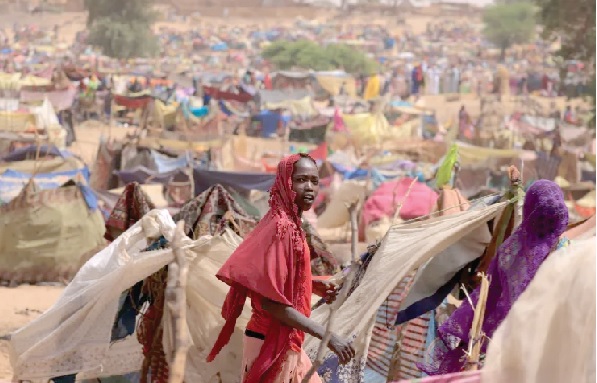
Shift Focus: Address Sudan’s neglected crisis amid Middle East turmoil
As rebels advance on Damascus, Syria’s civil war dominates global headlines, raising urgent questions about the fate of President Bashar al-Assad’s regime and the intentions of opposition forces.
This crisis, with its regional and international implications, rightly commands attention.
However, in stark contrast, Sudan’s devastating civil war, marked by horrific humanitarian consequences, continues to unfold largely unnoticed.
This disproportionate focus exposes a troubling hierarchy in international responses to global crises, where geopolitical interests overshadow human suffering.
The Sudanese civil war has brought unspeakable misery: millions displaced, widespread famine, rampant sexual violence and the collapse of vital infrastructure.
The situation demands urgent action, yet international efforts to mediate peace between Sudan’s warring factions remain woefully inadequate.
This neglect is not only a moral failure but also a strategic blunder, as Sudan's instability threatens to destabilise the entire region.
Global spotlight on Syria
Syria’s civil war, entering its second decade, has been marked by unparalleled destruction and human suffering.
The conflict has displaced millions, killed hundreds of thousands, and drawn in numerous state and non-state actors, including global powers such as the United States and Russia. For many, Syria represents a geopolitical chessboard where rivalries and interests converge, elevating its status in international discussions.
The fall of Damascus to rebel forces would symbolise a seismic shift in the Middle East, with consequences for Iran, Hezbollah, Israel and the broader Sunni-Shia divide.
This geopolitical weight explains the extensive media coverage and diplomatic engagement. Yet, while Syria undoubtedly warrants attention, the singular focus on its crisis risks overshadowing equally dire situations elsewhere, particularly in Africa.
Sudan’s overlooked catastrophe
Sudan’s ongoing civil war is as complex as Syria’s and arguably more catastrophic in its human toll.
Triggered by power struggles between the Sudanese Armed Forces (SAF) and the Rapid Support Forces (RSF), the conflict has plunged the country into chaos.
Cities lie in ruins, basic services are non-existent, and millions face acute food shortages. Refugees flood into neighbouring countries, spreading the crisis across borders.
Unlike Syria, Sudan lacks the same geopolitical pull. It is not a battleground for superpowers, nor does it host oil fields critical to global markets.
Consequently, international media coverage is sparse, and diplomatic initiatives are half-hearted. The African Union (AU) has struggled to lead mediation efforts, while global powers have shown limited commitment beyond rhetorical condemnations.
This neglect reveals an uncomfortable truth: the international community often prioritises crises based on strategic interests rather than the scale of human suffering.
Sudan’s plight is reduced to an African problem, sidelined in the broader discourse of global responsibility.
Equal attention
To address this imbalance, the world must confront its selective activism. The suffering of a child in Khartoum is no less harrowing than that of a child in Aleppo.
Human dignity should not be contingent on geography or strategic relevance. The international community has a moral obligation to address all crises with equal vigour.
For Sudan, this means increasing diplomatic pressure on the SAF and RSF to negotiate a ceasefire, while providing robust support to humanitarian agencies working on the ground.
The AU, backed by the United Nations (UN) and global powers, must lead a coordinated effort to mediate peace. Financial and logistical support for these initiatives is crucial, as is ensuring accountability for atrocities committed during the conflict.
Syria for Sudan
Syria offers sobering lessons for Sudan. The international community’s initial hesitance to intervene decisively in Syria allowed the conflict to spiral, creating a breeding ground for extremism and regional instability. Sudan faces a similar risk.
The longer the world delays action, the more entrenched the conflict becomes, increasing the likelihood of warlordism, extremism and protracted instability.
Proactive measures are essential. International actors must engage Sudan’s neighbours to prevent the spillover of violence. Humanitarian corridors must be established to ensure aid reaches those in need.
Additionally, targeted sanctions against leaders of the SAF and RSF could pressure them into negotiations.
While addressing Sudan’s crisis, the world must also prevent Syria from descending further into chaos.
The likely fall of Damascus poses both risks and opportunities. Without coordinated international action, Syria could fragment further, creating vacuums exploited by extremists.
A multilateral approach is necessary to stabilise Syria post-Assad. This includes rebuilding institutions, supporting moderate opposition groups, and ensuring that regional actors refrain from using Syria as a proxy battlefield.
Humanitarian aid must be prioritised, alongside efforts to facilitate the return of refugees and rebuild communities destroyed by war.
Path Forward
Both Sudan and Syria highlight the urgent need for a more equitable global response to crises.
The international community must recognise that selective intervention undermines its credibility and exacerbates global instability. Sudan’s crisis demands the same level of attention, resources and urgency as Syria’s.
The UN must take a leading role in orchestrating a dual-track approach. For Sudan, this involves mobilising international support for peace negotiations and humanitarian aid.
For Syria, it requires planning for a post-Assad future while addressing the immediate needs of those affected by the war.
Regional organisations also have a role to play. The AU must step up its efforts in Sudan, while the Arab League and Gulf Cooperation Council should contribute to Syria’s stabilisation.
Collaboration between these bodies and global powers is essential to ensure a comprehensive and coordinated response.
Challenge
The disparity in global attention to Syria and Sudan is a stark reminder of the biases that shape international responses to crises. It challenges us to rethink our priorities and commitments as a global community.
Human suffering should never be overshadowed by political calculus. The people of Sudan and Syria deserve the world’s unwavering support.
Only through decisive and equitable action can we hope to alleviate their suffering and build a foundation for lasting peace.
In addressing these crises, the international community has an opportunity to reaffirm its commitment to the principles of human dignity and justice. Let us not squander it.
